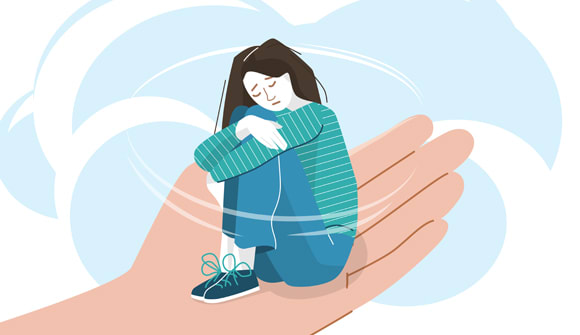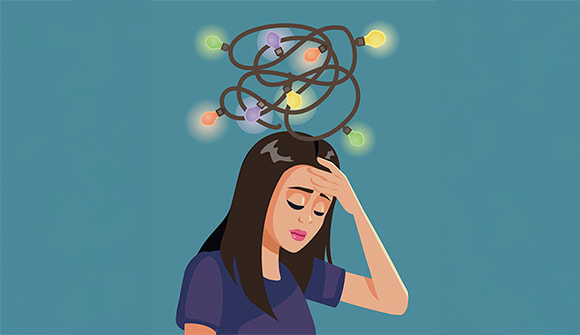What is TMS?
An alternative treatment for depression that doesn’t respond to meds.
Article Author: Katie McPherson
Article Date:

Just as new treatment approaches are developed each year for physical ailments and chronic conditions, the medications and technology used to treat mental illnesses keep advancing, too.
Traditionally, medications have been the go-to treatment for conditions like depression, anxiety and panic disorders. Many patients also benefit from cognitive behavioral therapy (or CBT, a type of therapy which helps develop coping strategies), or a blend of both therapy and medication. But not all cases of depression respond to these methods. Shariq Refai, MD, a psychiatrist with Baptist Behavioral Health, offers an alternative treatment approach: TMS.
How it works
“Transcranial magnetic stimulation (TMS) is a non-invasive, safe and effective medical procedure that works by delivering highly focused, MRI-strength magnetic pulses to stimulate the brain. It is FDA-approved to treat depression. In an open-label trial, 67% of patients saw significant improvement in their depression symptoms, and 45% were considered in remission,” said Dr. Refai. “A TMS treatment session is conducted using a small handheld device called a treatment coil that delivers energy to the brain using pulsed magnetic fields similar to those used in MRI machines.”
“I’m tired of being depressed.”
Gary Stoner works as a pharmacist at Baptist Medical Center South. He has experienced depression for many years, but was unable to find an effective treatment.
“I’ve been in and out of counseling for a long time. A lot of the medications I took I couldn’t tolerate, and I didn’t want to increase the dosage because I knew what some of the side effects were,” he said. “I gained a lot of weight with many of the medications, which didn’t help my depression.”
Gary’s depression didn’t seem to improve despite trying therapy and a variety of prescription medications. Then, after nearly five years of accompanying his wife, who was ill, to doctors’ appointments and hospital visits, she passed away in 2018. Understandably, his depression worsened.
“My wife died two years ago after being married almost 49 years. It’s tough getting used to being alone. I’d go back to bed at 11 am and again at 1 pm just to try and get away from everything.”
Marianna Georgiadou, licensed mental health counselor at Baptist Behavioral Health, recommended TMS treatment to Gary during an appointment. He decided it was worth a shot.
“I thought, ‘I’m 71 and I’m tired of being depressed, of overreacting, of having anxiety that cripples my ability to function,’” Gary said. “I had nothing to lose.”
“For most patients, the initial phase of TMS treatment involves around 30 treatment sessions over a four- to six-week period,” said Dr. Refai. “We usually do these as 20-minute treatment sessions each day, Monday through Friday. After this phase, treatment becomes more about maintenance. Maintenance treatments may be required in the future, depending upon individual needs, and the patient can schedule those at any time.”
Relieving results
Gary said he noticed an immediate improvement in his depression once he began TMS treatments. It wasn’t a cure for his depression, but he finally got some relief.
“I felt better after the first week. I looked forward to going to the appointments. After I had the first treatment and was walking out to the car, I felt like I had more energy, like a weight was lifted off my shoulders. That didn’t carry on 24/7 of course, but I had a lot of other [difficult] things going on in my life at that time. I didn’t experience many side effects, only some headaches.”
Gary completed his TMS treatment schedule and now feels he may benefit from ongoing TMS treatments. Because TMS is an outpatient procedure, it’s an accessible option for patients who feel this way.
“TMS does not involve medications or surgery, and it’s done in an outpatient setting with no interruption to your daily life, no anesthesia needed, and few or no side effects at all,” Dr. Refai said. “Also, most major insurance carriers now cover TMS treatments.”
Gary agreed that, while he still deals with depression, he can tell TMS made a difference for him when nothing else had.
“I think TMS has helped me cope with depression. It doesn’t take away the feelings you have, but helps you deal with them better. The main thing is, TMS doesn’t take away the challenges you face, but it’ll make them easier to manage.”
Time for TMS?
The best way to determine if TMS is right for you is by speaking with your doctor, psychiatrist, or another qualified mental health care professional.
“We screen each patient to ensure that TMS is administered only when it’s medically advisable,” explained Dr. Refai. “It is most appropriate for patients who are currently diagnosed with treatment-resistant depression by their provider, and who have no implanted metal from past surgeries or injuries. We will determine this together before ever beginning treatment.”
If you are interested in TMS treatment or other mental health services offered by Baptist Behavioral Health, call 904.376.3800 to make an appointment.



